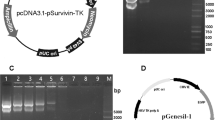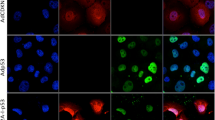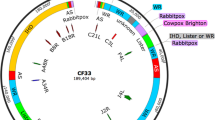Abstract
The chicken anemia virus–derived Apoptin protein shows remarkable specificity; namely, it induces apoptosis in tumor cells, but not in normal diploid cells. We have exploited the Apoptin gene for use in cancer gene therapy. Here we demonstrate that adenovirus-mediated intratumoral transfer and expression of the Apoptin gene results in regression or complete remission of human hepatomas grown as xenografts in immune-deficient mice, and significantly increases their survival long term. Early after intratumoral injection, Apoptin could be detected in significant quantities by Western blot analyses and immunohistochemistry. Furthermore, cell death and disruption of the tumor integrity were apparent in the transduced regions. This experimental gene therapeutic strategy constitutes a unique example of specific antitumor activity using a virus-derived gene with broad-spectrum applicability.
This is a preview of subscription content, access via your institution
Access options
Subscribe to this journal
Receive 12 print issues and online access
$259.00 per year
only $21.58 per issue
Buy this article
- Purchase on Springer Link
- Instant access to full article PDF
Prices may be subject to local taxes which are calculated during checkout





Similar content being viewed by others
References
Jeurissen SH, Wagenaar F, Pol JM, van der Eb AJ, Noteborn MHM . Chicken anemia virus causes apoptosis of thymocytes after in vivo infection and of cell lines after in vitro infection J Virol 1992 66: 7383–7388
Van der Eb AJ, Todd D, Noteborn MHM . Genus Gyrovirus (Circoviridae) In: Tidona CA, Darai G, eds. The Springer Index of Viruses Heidelberg, Germany: Springer-Verlag In press
Noteborn MHM, van der Eb AJ . Apoptin induces apoptosis in transformed cells specifically: Potentials for an antitumor therapy Biog Amines 1999 15: 73–91
Danen-van Oorschot AAAM, Fischer DF, Grimbergen JM et al. Apoptin induces apoptosis in human transformed and malignant cells but not in normal cells Proc Natl Acad Sci USA 1997 94: 5843–5847
Noteborn MHM, Zhang YH, van der Eb AJ . Apoptin specifically causes apoptosis in tumor cells and after UV-treatment in untransformed cells from cancer-prone individuals: a review Mutat Res 1998 400: 447–455
Danen-van Oorschot AAAM, van der Eb AJ, Noteborn MHM . The CAV-derived protein apoptin requires activation of caspases for induction of apoptosis in human tumor cells J Virol 2000 74: 7072–7078
Danen-van Oorschot AAAM, Zhang Y, Erkeland SJ, Fischerr DF, van der Eb AJ, Noteborn MHM . The effect of Bcl-2 on Apoptin in ‘normal’ vs. transformed human cells Leukemia 1999 13: S75–S77
Pietersen AM, van der Eb MM, Rademaker HJ et al. Specific tumor-cell killing with adenovirus vectors containing the apoptin gene Gene Ther 1999 6: 882–892
Noteborn MHM, Todd D, Verschueren CAJ et al. A single chicken anemia virus protein induces apoptosis J Virol 1994 68: 346–351
Pelengaris S, Rudolph B, Littlewood T . Action of Myc in vivo —proliferation and apoptosis Curr Opin Genet Dev 2000 1: 100–105
Hu Z, Ito T, Yuri K, Xie C, Ozawa H, Kawata M . In vivo time course of morphological changes and DNA degradation during the degeneration of castration-induced apoptotic prostate cells Cell Tissue Res 1998 1: 153–160
Negoescu A, Labat-Moleur F, Defaye G et al. Contribution of apoptosis to the phenotypic changes of adrenocortical cells in primary culture Mol Cell Endocrinol 1995 110: 175–184
Arends MJ, McGregor AH, Wyllie AH . Apoptosis is inversely related to necrosis and determines net growth in tumors bearing constitutively expressed myc, ras, and HPV oncogenes Am J Pathol 1994 144: 1045–1057
Qazilbash MH, Xiao X, Seth P, Cowan KH, Walsh CE . Cancer gene therapy using a novel adeno-associated virus vector expressing human wild-type p53 Gene Ther 1997 4: 675–682
Wallace-Brodeur RR, Lowe SW . Clinical implications of p53 mutations Cell Mol Life Sci 1999 1: 64–75
Reed JC . Bcl-2: prevention of apoptosis as a mechanism of drug resistance Hematol Oncol Clin North Am 1995 2: 451–473
Hickman JA, Potten CS, Merritt AJ, Fisher TC . Apoptosis and cancer chemotherapy Philos Trans R Soc London, Ser B: Biol Sci 1994 1313: 319–325
Noteborn MHM, Danen-van Oorschot AAAM, van der Eb AJ . The apoptin gene of chicken anemia virus in the induction of apoptosis in human tumorigenic cells and in gene therapy of cancer Gene Ther Mol Biol 1998 1: 399–406
Van der Eb MM, Cramer SJ, Vergouwe Y et al. Severe hepatic dysfunction after adenovirus-mediated transfer of the herpes simplex virus thymidine kinase gene and ganciclovir administration Gene Ther 1998 4: 451–458
Brand K, Arnold W, Bartels T et al. Liver-associated toxicity of the HSV-tk/GCV approach and adenoviral vectors Cancer Gene Ther 1997 1: 9–16
Bischoff JR, Kirn DH, Williams A et al. An adenovirus mutant that replicates selectively in p53-deficient human tumor cells Science 1996 274: 373–376
Doronin K, Toth K, Kuppuswamy M, Ward P, Tollefson AE, Wold WS . Tumor-specific, replication-competent adenovirus vectors overexpressing the adenovirus death protein J Virol 2000 74: 6147–6155
Fallaux FJ, Bout A, van der Velde I et al. New helper cells and matched early region 1–deleted adenovirus vectors prevent generation of replication-competent adenoviruses Hum Gene Ther 1998 9: 1909–1917
Van den Heuvel SJ, van Laar T, Kast WM, Melief CJ, Zantema A van der Eb AJ . Association between the cellular p53 and the adenovirus 5 E1B-55kd proteins reduces the oncogenicity of Ad-transformed cells EMBO J 1990 8: 2621–2629
Herz J, Gerard RD . Adenovirus-mediated transfer of low density lipoprotein receptor gene acutely accelerates cholesterol clearance in normal mice Proc Natl Acad Sci USA 1993 7: 2812–2816
Fallaux FJ, Kranenburg O, Cramer SJ et al. Characterization of 911: a new helper cell line for the titration and propagation of early region 1–deleted adenoviral vectors Hum Gene Ther 1996 7: 215–222
Gratzner HG . Monoclonal antibody to 5-bromo- and 5-iododeoxyuridine: A new reagent for detection of DNA replication Science 1982 4571: 474–475
Acknowledgements
The authors gratefully thank S Le Cessie (Department of Medical Statistics, Leiden University) for statistical analysis, and Dr. PM Voorhoeve and Dr. JL Rohn for critical review of the manuscript and stimulating discussions. This work was supported by a research Grant from the Netherlands Ministry of Economic Affairs.
Author information
Authors and Affiliations
Corresponding author
Rights and permissions
About this article
Cite this article
van der Eb, M., Pietersen, A., Speetjens, F. et al. Gene therapy with Apoptin induces regression of xenografted human hepatomas. Cancer Gene Ther 9, 53–61 (2002). https://doi.org/10.1038/sj.cgt.7700397
Received:
Published:
Issue Date:
DOI: https://doi.org/10.1038/sj.cgt.7700397
Keywords
This article is cited by
-
Combination of VP3 and CD147-knockdown enhance apoptosis and tumor growth delay index in colorectal tumor allograft
BMC Cancer (2016)
-
Tumor control by human cytomegalovirus in a murine model of hepatocellular carcinoma
Molecular Therapy - Oncolytics (2016)
-
Viral genes as oncolytic agents for cancer therapy
Cellular and Molecular Life Sciences (2015)
-
Targeting Gene-Viro-Therapy with AFP driving Apoptin gene shows potent antitumor effect in hepatocarcinoma
Journal of Biomedical Science (2012)
-
Potent anti-tumor effects of a dual specific oncolytic adenovirus expressing apoptin in vitro and in vivo
Molecular Cancer (2010)



